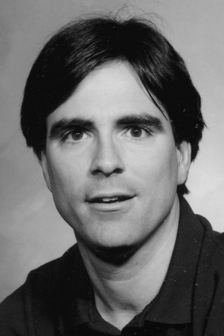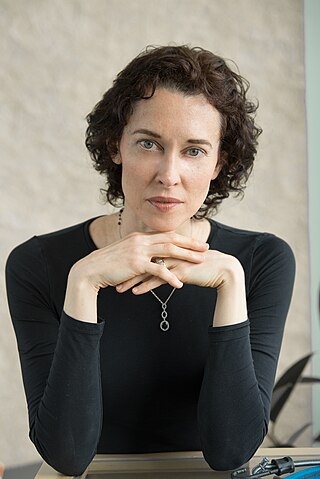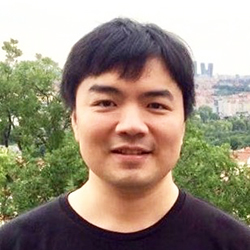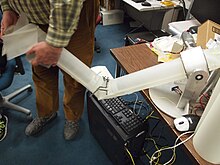
Carnegie Mellon University (CMU) is a private research university in Pittsburgh, Pennsylvania. The institution was originally established in 1900 by Andrew Carnegie as the Carnegie Technical Schools. In 1912, it became the Carnegie Institute of Technology and began granting four-year degrees. In 1967, it became the current-day Carnegie Mellon University through its merger with the Mellon Institute of Industrial Research, founded in 1913 by Andrew Mellon and Richard B. Mellon and formerly a part of the University of Pittsburgh.

The School of Computer Science (SCS) at Carnegie Mellon University in Pittsburgh, Pennsylvania, US is a school for computer science established in 1988. It has been consistently ranked among the top computer science programs over the decades. As of 2022 U.S. News & World Report ranks the graduate program as tied for second with Stanford University and University of California, Berkeley. It is ranked second in the United States on Computer Science Open Rankings, which combines scores from multiple independent rankings.

Dabbala Rajagopal "Raj" Reddy is an Indian-born American computer scientist and a winner of the Turing Award. He is one of the early pioneers of artificial intelligence and has served on the faculty of Stanford and Carnegie Mellon for over 50 years. He was the founding director of the Robotics Institute at Carnegie Mellon University. He was instrumental in helping to create Rajiv Gandhi University of Knowledge Technologies in India, to cater to the educational needs of the low-income, gifted, rural youth. He is the chairman of International Institute of Information Technology, Hyderabad. He is the first person of Asian origin to receive the Turing Award, in 1994, known as the Nobel Prize of Computer Science, for his work in the field of artificial intelligence.

The Robotics Institute (RI) is a division of the School of Computer Science at Carnegie Mellon University in Pittsburgh, Pennsylvania, United States. A June 2014, the article in Robotics Business Review magazine calls it "the world's best robotics research facility" and a "pacesetter in robotics research and education."

Sebastian Thrun is a German-American entrepreneur, educator, and computer scientist. He is CEO of Kitty Hawk Corporation, and chairman and co-founder of Udacity. Before that, he was a Google VP and Fellow, a Professor of Computer Science at Stanford University, and before that at Carnegie Mellon University. At Google, he founded Google X and Google's self-driving car team. He is also an adjunct professor at Stanford University and at Georgia Tech.

Red Whittaker is a roboticist and research professor of robotics at Carnegie Mellon University. He led Tartan Racing to its first-place victory in the DARPA Grand Challenge (2007) Urban Challenge and brought Carnegie Mellon University the two million dollar prize. Previously, Whittaker also competed for the DARPA Grand Challenge placing second and third place simultaneously, in the Grand Challenge Races.

The Human–Computer Interaction Institute (HCII) is a department within the School of Computer Science at Carnegie Mellon University (CMU) in Pittsburgh, Pennsylvania. It is considered one of the leading centers of human–computer interaction research, and was named one of the top ten most innovative schools in information technology by Computer World in 2008. For the past three decades, the institute has been the predominant publishing force at leading HCI venues, most notably ACM CHI, where it regularly contributes more than 10% of the papers. Research at the institute aims to understand and create technology that harmonizes with and improves human capabilities by integrating aspects of computer science, design, social science, and learning science.

Randolph Frederick Pausch was an American educator, a professor of computer science, human–computer interaction, and design at Carnegie Mellon University (CMU) in Pittsburgh, Pennsylvania.

Manuela Maria Veloso is the Head of J.P. Morgan AI Research & Herbert A. Simon University Professor in the School of Computer Science at Carnegie Mellon University, where she was previously Head of the Machine Learning Department. She served as president of Association for the Advancement of Artificial Intelligence (AAAI) until 2014, and the co-founder and a Past President of the RoboCup Federation. She is a fellow of AAAI, Institute of Electrical and Electronics Engineers (IEEE), American Association for the Advancement of Science (AAAS), and Association for Computing Machinery (ACM). She is an international expert in artificial intelligence and robotics.

Subra Suresh is an Indian-born American bioengineer, materials scientist, and academic. On 1 January 2018, he was inaugurated as the fourth President of Singapore's Nanyang Technological University (NTU), where he is also the inaugural Distinguished University Professor. Subra Suresh plans on stepping down from his role as the President of NTU at the end of 2022. He was the Vannevar Bush Professor of Engineering at the Massachusetts Institute of Technology (MIT), and Dean of the School of Engineering at MIT from 2007 to 2010 before being appointed as Director of the National Science Foundation (NSF) by Barack Obama, where he served from 2010 to 2013. He was the president of Carnegie Mellon University (CMU) from 2013 to 2017.

Robert F. Murphy is Ray and Stephanie Lane Professor of Computational Biology Emeritus and Director of the M.S. Program in Automated Science at Carnegie Mellon University. Prior to his retirement in May 2021, he was the Ray and Stephanie Lane Professor of Computational Biology as well as Professor of Biological Sciences, Biomedical Engineering, and Machine Learning. He was founding Director of the Center for Bioimage Informatics at Carnegie Mellon and founded the Joint CMU-Pitt Ph.D. Program in Computational Biology. He also founded the Computational Biology Department at Carnegie Mellon University and served as its head from 2009 to 2020.
Barbara Shinn-Cunningham is an American bioengineer and neuroscientist. She is the founding Director of the Carnegie Mellon University Neuroscience Institute, the George A. and Helen Dunham Cowan Professor of Auditory Neuroscience, and Professor of Psychology, Electrical and Computer Engineering, and Biomedical Engineering.

Eric Poe Xing is an American computer scientist, academic administrator, and entrepreneur. Prior to his appointment as President of MBZUAI, Xing was a professor in the School of Computer Science at Carnegie Mellon University and researcher in machine learning, computational biology, and statistical methodology. Xing is also the Founder, Chairman, Chief Scientist, and former CEO of Petuum Inc.

The Computational Biology Department (CBD) is a division within the School of Computer Science at Carnegie Mellon University in Pittsburgh, Pennsylvania, United States. It is located in the Gates-Hillman Center. Established in 2007 by Robert F. Murphy as the Lane Center for Computational Biology with funding from Raymond J. Lane and Stephanie Lane, CBD became a department within the School of Computer Science in 2016.
Jessica K. Hodgins is an American roboticist and researcher who is a professor at Carnegie Mellon's Robotics Institute and School of Computer Science. Hodgins is currently also Research Director at the Facebook AI Research lab in Pittsburgh next to Carnegie Mellon. She was elected the president of ACM SIGGRAPH in 2017. Until 2016, she was Vice President of Research at Disney Research and was the Director of the Disney Research labs in Pittsburgh and Los Angeles.

Jennifer Hartt Elisseeff is an American biomedical engineer, ophthalmologist and academic. She is the Morton Goldberg Professor and Director of the Translational Tissue Engineering Center at Johns Hopkins Department of Biomedical Engineering and the Wilmer Eye Institute with appointments in Chemical Engineering, Biomedical Engineering, Materials Science and Orthopedic Surgery. Elisseeff's research is in the fields of regenerative medicine and immunoengineering. She was elected a Fellow of the American Institute for Medical and Biological Engineering, the National Academy of Inventors, and a Young Global Leader by the World Economic Forum. In 2018, she was elected to the National Academy of Engineering for "development and commercial translation of injectable biomaterials for regenerative therapies." That same year, she was also elected to the National Academy of Medicine, and in 2019 she received the NIH Director's Pioneer Award. Her research has been cited over 23,000 times and she has an h-index over 75.
Roni Rosenfeld is an Israeli-American computer scientist and computational epidemiologist, currently serving as the head of the Machine Learning Department at Carnegie Mellon University. He is an international expert in machine learning, infectious disease forecasting, statistical language modeling and artificial intelligence.

Jian Ma is an American computer scientist and computational biologist. He is the Ray and Stephanie Lane Professor of Computational Biology in the School of Computer Science at Carnegie Mellon University. He is a faculty member in the Computational Biology Department. His lab develops machine learning algorithms to study the structure and function of the human genome. During his Ph.D. and postdoc training, he developed algorithms to reconstruct the ancestral mammalian genome. His research group has recently pioneered a series of new machine learning methods for 3D epigenomics and spatial genomics. He received an NSF CAREER award in 2011. In 2020, he was awarded a Guggenheim Fellowship in Computer Science. He is an elected Fellow of the American Association for the Advancement of Science. He leads an NIH 4D Nucleome Center to develop machine learning algorithms to better understand the cell nucleus.
Maria-Florina (Nina) Balcan is a Romanian-American computer scientist whose research investigates machine learning, algorithmic game theory, theoretical computer science, including active learning, kernel methods, random-sampling mechanisms and envy-free pricing. She is an associate professor of computer science at Carnegie Mellon University.
Michael Williams is an experimental particle physicist, faculty member at MIT, and inaugural Deputy Director of the NSF AI Institute for Artificial Intelligence and Fundamental Interactions (IAIFI).
















